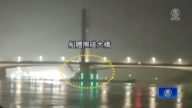【新唐人2014年06月10日訊】近來,大陸當局一改以往由水利部門定量劃分城市用水指標的格局,宣佈建立了水權交易機制,用不完的水可以由各省自行買賣。而民眾諷刺,賣地、賣官、賣路,讓中共官員們嚐到了甜頭,現在又將黑手伸向了水資源,下一步會不會賣空氣和陽光?最後是不是連中國人都要被賣掉。
《南方都市報》報導,日前在新加坡舉辦的國際水資源周,中國水利部官員對外透露,大陸即將啟動水權交易,先由國家將水權分配給各省市,各地用不完的指標可以相互交易,進行二次分配。用水指標包括江河水、地下水和地表水。
這一消息公開後,遭到了民間的廣泛質疑和非議。網民們紛紛怒斥當局「挖空心思搶錢」、「想錢想瘋了」。也有網友質問:當局不治理水污染,反倒想賣水,憑甚麼?水是自然資源,又不是你(當局)製造的,它屬於全人類,不屬於任何人,談何買賣? 有人則諷刺當局「地賣完了又開始賣水,是不是將來要賣空氣?」。
江蘇宜興市環保活動人士吳立紅:「老百姓的擔憂是完全正確的。這個環境水資源是大自然賦予人類的,不可能是誰誰去買斷它,如果你搞壟斷,那裏面就有利益鏈,就涉及到腐敗問題。」
中共當局為了證實水權交易的「可行性」,還聲稱,水權交易機制早已是國際的通行做法,在新加坡、馬來西亞、泰國之間,多餘的水資源可以互相交易。而這種說法同樣遭到了民眾反駁。
一名澳大利亞網友在網上發帖說:人家可是國與國之間的交易,各自為國民謀資源。你(中共當局)卻是操控資源,謀國民錢財!
還有網友提出:買賣可以,錢該歸誰?讓百姓節水,你們賣錢?當我們傻嗎?你說你投入公共服務,請問有沒有明細賬單?……
吳立紅:「它(中共當局)為了掩蓋自己,要找這樣、那樣的理由和說法。」
北京水污染環保自願者張峻峰:「沒有顧及水資源運行的基本規則,完全從資本的角度,或者從市場的角度去思考這種社會管理的模式。那這種管理模式我想畢竟是短視的,會造成很多問題。它只是考慮了一個資本運行的規律,我想有點太過於簡單、直接、甚至於有些太赤裸裸的以一種市場的方式,進行社會管理。」
據《中國環境法網》評論文章指出,任何市場交易都會產生投機行為,交易的目地是牟利,而缺乏法律規制的交易,肯定會產生非法牟利行為。對巨額的環境權益交易,尤其需要立法規制。如同絕對權力導致絕對腐敗一樣,巨額利益的誘惑,容易使所謂「市場主體」鋌而走險。
評論還指出,如果沒有完備的法制約束「市場主體」行為,追究違法「市場主體」的法律責任,則「市場主體」出於利益驅動,很可能會採取不正當競爭手段,或者採用表面合法的手段達到非法目地,侵害公眾環境權益。
張峻峰:「如果要是真是出現這樣一種狀態,那我可以說,這種水權交易是注定失敗的,而且是違反社會發展的規律的,是破壞生態的一種行為。」
然而,據相關資料顯示,水權交易的「市場主體」是地方政府,這等於如果沒有健全的法律制度、獨立公正的司法體系以及輿論和公眾的監督,很難保證地方政府不會藉水權交易的機會牟取私利。但對於百姓而言,健全的法律制度等三個條件,恰恰是一黨專政的中國大陸所不具備的,因此才會引發民間的強烈牴觸和擔憂。
吳立紅:「本身這個(中共)體制就這麼腐敗,就這麼缺陷。它(中共當局)搞這種條款,沒有經過專家認真的聽從民眾意見,貿貿然然出來的話,肯定遭反抗跟牴觸。」
另一方面,雖然中共當局聲稱水權交易是基於公平用水的原則產生,但在中共官員的操控下最終會不會變成利益原則、刮民原則和特權主義原則,也令人質疑﹗﹖
採訪編輯/張天宇 後製/舒燦
Mainland Chinese Authorities Intends Selling
Water Resources for Profit.
Recently, Mainland Chinese authorities phased out
a prior policy of water conservancy,
quantitatively allocating water consumption quota ‘s to each city,
in hope of developing a water rights trading mechanism.
Any water left over, each province will be allowed to sell
it off, making their own profit.
People satirised the officials of the Chinese
Communist Party (CCP),
claiming, to sell land resources, official positions
and highways, has brought huge benefits to the officials,
now they stretch out their dirty hands
in to the fields of water resources.
They also questioned: What will CCP sell next? The air
and the sunshine?
Finally, the question must be asked, will they sell out on
the citizens of China?
According to the news report of Southern Metropolis Daily,
during the International Water Resource Week
held in Singapore,
an official from Water Resource Ministry of CCP,
disclosed that Mainland China will launch a water
rights business.
The Central Government will allocate the water rights
quota to each province,
and then the redundant or un-used water quotas,
are allowed to be re-traded elsewhere for a second time
as water resources.
The quotas for water resources covers river water,
underground water and surface water.
After the news was published, the policy has been
widely questioned and criticised by the people.
Netizens angrily renounced that CCP is robbing people
via any means, and being literally crazy for money.
Some netizens questioned: the authorities sell the water
resources rather than to treat the water pollution,
how can they have such authorisation to do so?
Water is a natural resource, and is not a product
of the authorities.
Water belongs to the entire human race, rather
than to any individual, how can it be traded?
Some people again satirised the government:
“The land has been sold out, now it is time
to sell the water,
and in the future, do intend to sell the air?"
Environment protection activist Wu Lihong of Yixing City
of Jiangsu Province:"The concerns of the ordinary people are justified.
Such water resource is endowed to us
by the virtues of Mother Nature.
It is impossible for anyone to buy our water. If someone
wishes to be a part of the monopoly,
there is likely to be many people interested, which also
involves the issues of corruption."
In order to confirm the “viability" of the water
rights business,
the CCP authorities claimed, that water rights trade
mechanisms,
have already been applied universally across the world.
Amongst Singapore, Malaysia and Thailand, redundant
water resources can be traded between them.
But such a saying is refuted by the people.
One Australian netizen says on the internet:
that sort of trade is done among different countries,
and is to obtain benefits for themselves.
But you ( CCP authorities) are manipulating
the resources, grabbing money from the people.
Another netizen says: business is permitted,
but who will own the revenues?
To ask people to save water and use sparingly, is only
to benefit the government in making money.
Do you think we are mere fools? You tell us such
revenues have been used to invest in public services.
Yet we see no proof, are there any detailed accounts?
Wu Lihong: “They ( CCP ) look for excuses,
hiding the real truth and camouflaging themselves."
Beijing environment volunteer for treating water pollution;
Mr Zhang Junfeng:"This policy ignores the basic rules of water
resource operations.
It is to implement the social administration patterns,
which invariably aim at capital and markets.
I think such administration patter is after all short-sighted,
which will spark many problems.
It only considers the law of capital operation.
I think this is to carry out the social management
in a too simple, too direct, and even too bare market way."
In an article upon the Chinese Environment
Law website it states,
any market business will trigger speculation behaviours.
The trade aims at profit.
Without regulatory laws ‘in place, trades will
produce illegal profitable actions.
With such huge scale of trade and business, it is essential
to develop laws and restrictions.
Just like absolute power leading to absolute corruption,
the temptation to make large amounts of money, lures
key players in to the market.
Within such an arena, these players don ‘t mind
taking risks.
The commentary article also says, without a complete
set of laws to constrain “main market players,"
brings about the likelihood of illegal trading amongst
the “main market players."
It can also invoke trades to use legal means to achieve
illegal intentions, hence infringe public environmental rights.
Zhang Junfeng: “If it is true as said above, then I can say,
such water rights business is doomed to fail.
Furthermore, this is a matter of breaching the social
development law,
which can then lead to destruction of the ecological system."
However, according to relevant information, the “main
market players" of water rights business,is local government.
This is equal to saying, without a complete system of legal
representation or independent and a fair judicial system,
without public opinion and people monitoring,
it is hard to ensure that local governments will not make
their own profits via the water rights trading system.
But for the ordinary people, such conditions are
not in place.
As such without these policies in place, strong opposition
and conflict will arise.
Wu Lihong: “Such a (CCP) regime is just corruptive
and the regime has this weakness.
They ( CCP authorities) execute the policy
without consulting the experts and the public.
If they suddenly implement the policy,
it will of course be opposed."
On the other hand, although CCP have stated
that the water rights business was developed
based on the principle of equally using water resources,
but under the CCP officials ‘ control,
whether the principle eventually evolves in to a principle
of self interest,
a principle of bullying ordinary people, or one of privilege,
will remain to be seen.
Interview & Edit/Zhang Tianyu Post-Production/ShuChan




























